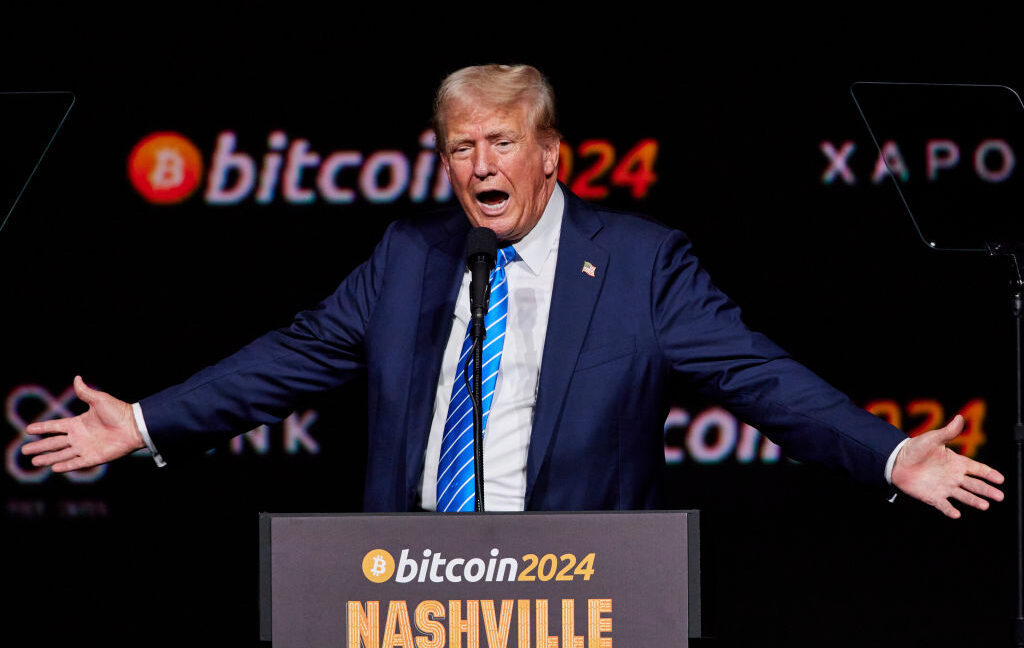Bitcoin hit a new record high late Monday, its value peaking at $89,623 as investors quickly moved to cash in on expectations that Donald Trump will end a White House crackdown that intensified last year on crypto.
While the trading rally has now paused, analysts predict that bitcoin's value will only continue rising following Trump's win—perhaps even reaching $100,000 by the end of 2024, CNBC reported.
Bitcoin wasn't the only winner emerging from the post-election crypto trading. Crypto exchanges like Coinbase also experienced surges in the market, and one of the biggest winners, CNBC reported, was dogecoin, a cryptocurrency linked to Elon Musk, who campaigned for Trump and may join his administration. Dogecoin's value is up 135 percent since Trump's win.
On the campaign trail, Trump began wooing the cryptocurrency industry, seeking donations and votes by promising to make the US the "crypto capital of the planet," Fortune reported. He announced the launch of his own crypto platform, World Liberty Financial (WLFI), and vowed to "fire" Gary Gensler—the Securities and Commission Exchange (SEC) chair leading the US crypto crackdown—on "day one" in office, Al Jazeera reported.
Whether Trump can actually fire Gensler is still up in the air, The Washington Post reported. It seems more likely that Trump may demote Gensler, The Post reported, since people familiar with the matter suggested that "fully outing" the current SEC chair "could trigger a novel and complicated legal battle over the president’s authorities." So far, Gensler has made no indications that he will step down once Trump takes office, although The Post noted that wouldn't be considered unusual.
Sources told The Post that Trump is considering "a mix of current regulators, former federal officials, and financial industry executives," for leadership positions, "many of whom have publicly expressed pro-crypto views."
Reportedly under consideration to replace Gensler are Daniel Gallagher, a former SEC official currently serving as chief legal officer for the financial technology firm Robinhood, and two Republican SEC commissioners, Hester Peirce and Mark Uyeda, The Post's sources said. Other names in the mix include a former SEC commissioner, Paul Atkins, and a former commissioner at the Commodity Futures Trading Commission, Chris Giancarlo.
While Gensler has made it his mission to increase the detection of crypto crimes, bitcoin has notably emerged as a trustworthy digital asset in a sea of scammy tokens. In early January, the SEC approved spot-bitcoin exchange-traded funds (ETFs), which caused bitcoin to hit its previous record high of $69,000. That approval made it easier to fund bitcoin investment projects, but despite the seeming endorsement, Gensler warned at the time that the SEC still viewed bitcoin as a "volatile asset" linked to "illicit activity" like ransomware, money laundering, sanction evasion, and terrorist financing.
Now, analysts are predicting that if Trump either clarifies laws or cuts back on regulatory scrutiny, bitcoin and other cryptocurrency trading could become more stable. His exact plans remain unclear, but at his boldest, he has suggested that bitcoin could be used to wipe out the US national debt, which crossed the $34 trillion mark early this year, Forbes reported.
"We'll hand them a little bitcoin and wipe out our $35 trillion," Trump reportedly said on the campaign trail.
Mauvis Ledford, CEO of a Singapore-based tech startup called Sogni AI, told Al Jazeera that Trump might launch initiatives promoting more widespread crypto adoption to spur economic growth, possibly with Musk serving as his adviser.
If that happened and crypto adoption potentially expanded, Ledford forecasted, more companies might be willing to integrate crypto into more products. And that could potentially fuel innovations in blockchain technologies, possibly painting a future where everyone involved benefits from a more transparent regulatory framework that "could provide more stability and legitimacy to the crypto market," Ledford said.
But we don't know yet how Trump's crypto plans will play out.
"I don’t personally believe anything Trump says," Ledford noted, indicating that he remains "cautious" in predicting "how far Trump might go in his support for cryptocurrencies."
As recently as August, when Trump seemed to be warming to the crypto industry, he told his followers on Truth Social, "You know they call me the crypto president. I don’t know if that’s true or not, but a lot of people are saying that."


